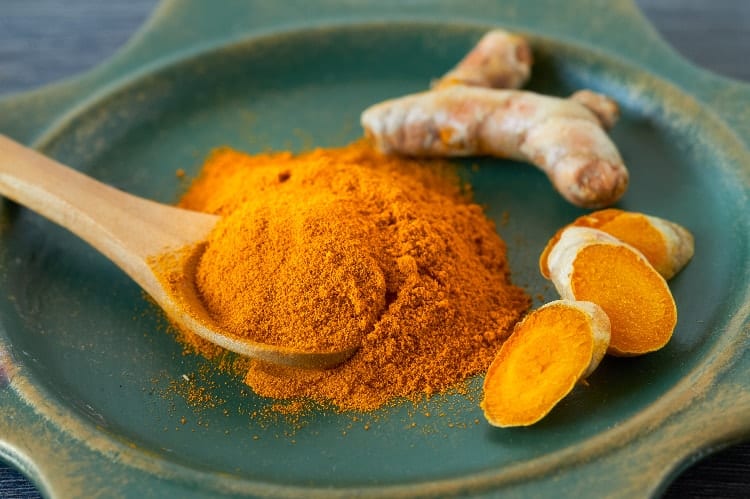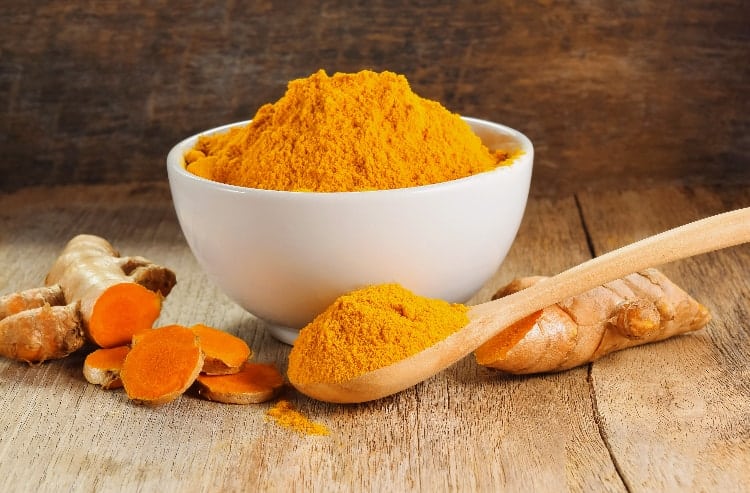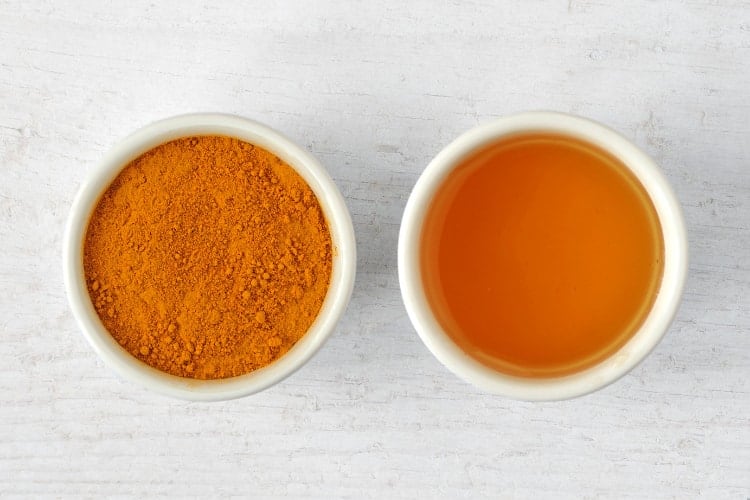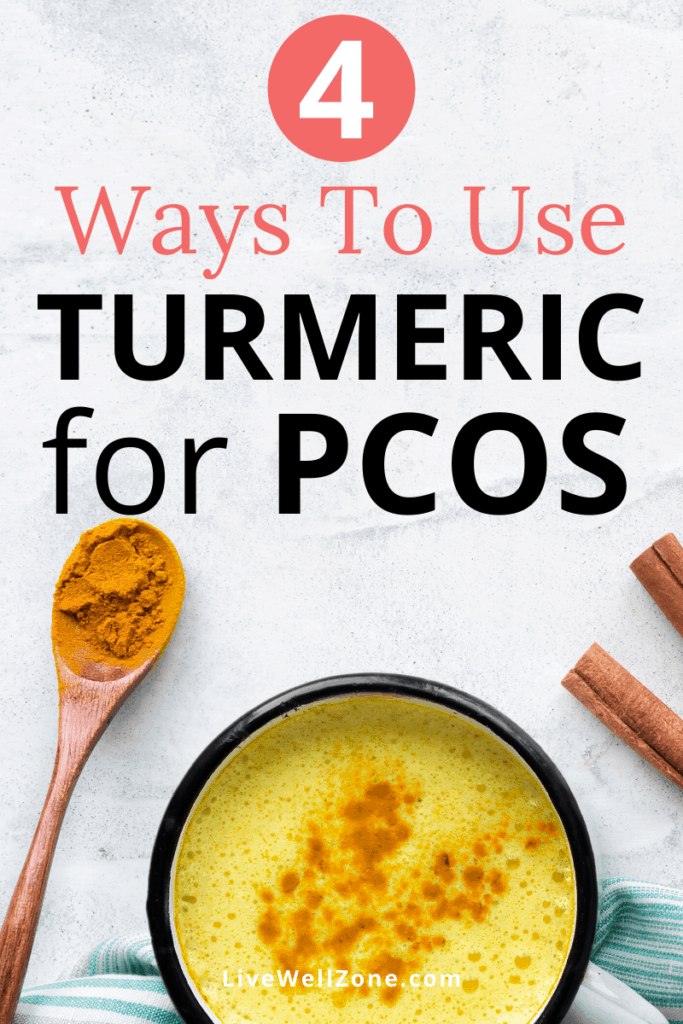
We always hear about how amazing turmeric is for our health. So, it probably comes as no surprise that there are plenty of potential benefits to using turmeric for PCOS.
Some experts see chronic, low-grade inflammation as a major factor in the development and progression of PCOS. As for turmeric, it’s known as one of the best anti-inflammatory foods.
Therefore, adding turmeric powder to your daily routine might help to address the inflammation that drives polycystic ovary syndrome.
In this article we’re going to look at the potential benefits of turmeric for PCOS and the different ways you can add it to your care plan.
Note: this post contains some affiliate links and I earn a commission (at no additional cost to you) if you use them to make a purchase.
BENEFITS OF TURMERIC AND HOW IT CAN HELP PCOS
1. Curbs Inflammation
The most researched compound in turmeric is curcumin. Curcumin is an antioxidant that is said to lower inflammation at the molecular level (source).
This can be incredibly helpful for PCOS because chronic inflammation and elevated cortisol usually go together.
And once cortisol is high, then this can also contribute to:
- high insulin levels.
- elevated blood sugar.
- increase in androgens (aka male hormones).
All three of the above are common in women with PCOS. So, addressing the underlying inflammation with an herb like turmeric, could provide much needed relief from PCOS symptoms.
2. Supports Healthy Liver Function
Toxins in food, water and environment are major contributors to stress and inflammation.
And when those toxins pile up in the body, the liver has to work harder to filter them out.
So, this means that in order to improve PCOS symptoms, you need a liver-friendly herb like turmeric.
Research shows that turmeric can protect the liver by (source):
- Significantly reducing bile duct blockage. The bile duct connects to the liver and when it’s blocked, bile accumulates in the liver. This can eventually cause all sorts of issues with liver function.
- Preventing damage to liver cells (which can easily occur when inflammation is high)
So, based on the above, using turmeric powder may help your liver to function optimally.
3. Lowers Oxidative Stress and Boosts Antioxidants
According to a 2016 study “PCOS can be considered as a purely oxidative state, where the body antioxidants cannot outweigh the excessive production of free radicals.”
Basically, this means that women with PCOS tend to have higher amounts of free radicals, and smaller amounts of antioxidants.
So, what are free radicals and why do they matter in PCOS?
Well, free radicals are byproducts of various metabolic processes in the body. They contribute to oxidative stress and have other harmful side effects on the body.
Now normally, free radicals are neutralized by antioxidants.
However, when there are more free radicals in the body than there are antioxidants, that’s a breeding ground for conditions like PCOS.
The good thing is you can change that by eating more antioxidant-rich foods.
Turmeric, in particular, is very beneficial because it contains antioxidants and it boosts the activity of the body’s own natural antioxidant enzymes.
A win-win all around 🙂
4. Improve Insulin Resistance
Insulin resistance is another major factor in PCOS.
And studies indicate that turmeric is effective at improving insulin resistance.
For example, a study done in Thailand showed that turmeric supplements can prevent pre-diabetic patients from progressing into diabetes (source).
So, by improving insulin resistance, turmeric may help PCOS symptoms like weight gain, irregular periods, acne and much more.
HOW TO USE TURMERIC POWDER FOR PCOS

There are 4 ways you can include turmeric into your diet and lifestyle:
- Drink turmeric milk (aka golden milk).
- Take a turmeric supplement.
- Use turmeric essential oil.
- Cook with raw turmeric.
1. Take Turmeric Capsules for PCOS
A turmeric supplement is the best way to get high amounts of the active ingredient, curcumin.
Now, there’s no shortage of turmeric supplements on the market! But before you grab any old supplement, make sure you use one that:
- contains the whole plant extracts.
- uses a gentle extraction method like supercritical CO2 extraction. This preserves the ingredients and produces a higher quality supplement.
My favorite turmeric supplement that happens to meet both of the above requirements is this Turmeric Supreme from Gaia.
2. Drink Turmeric Milk (aka Golden Milk) For PCOS
Turmeric milk (also referred to as golden milk or turmeric tea) is a soothing and delicious drink that you can enjoy daily.
You can drink it any time of day. However, it’s particularly beneficial as an evening drink because it helps you unwind, de-stress and sleep more soundly (at least it does for me!)
You can make your own golden milk at home with PCOS-friendly ingredients like cinnamon and ginger (see recipe further down).
Or you can use a premixed blend like this one.
NOTE: research shows that we get very little curcumin from eating turmeric. So, when using turmeric for medicinal purposes, it’s best to take it as a supplement. You will get higher amounts of curcumin.
3. Cook With Raw Turmeric
Aside from drinking turmeric milk, you can get regular doses of turmeric powder into your PCOS diet by adding it to:
- smoothies
- scrambled eggs
- soups
- stir fries
- fermented veggies
Experiment and see what works best for you!
Just like with drinking golden milk, cooking with turmeric won’t give you high amounts of curcumin. But you will get the benefits of the other components of turmeric.
4. Use Turmeric Essential Oil For Your Menstrual Cycle
Turmeric essential oil is anti-inflammatory and may help PCOS symptoms like menstrual cramps.
In addition, turmeric oil blends very well with clary sage, ylang ylang and ginger oil. All three of these oils are natural remedies for menstrual cramps.
Now, if you’ve never used turmeric essential oil before, here’s a period pain blend you can try (made at a 4% dilution)
- Combine 12 drops each of turmeric, clary sage and ginger oil with 1 ounce of almond oil in a glass bottle.
For the best quality turmeric oil, I suggest using this certified organic turmeric oil from Plant Therapy.
HOW TO MAKE TURMERIC MILK FOR POLYCYSTIC OVARY SYNDROME
Ingredients
1 cup plain almond milk
1/2 tsp cinnamon powder
1/4 tsp ginger powder
1/4 tsp turmeric powder
Pinch of black pepper
1 to 2 tsp raw honey to sweeten
Instructions
- Combine all the ingredients (except the raw honey) in a saucepan over medium-low heat.
- Simmer gently for approximately 5 minutes, stirring frequently.
- Pour into a cup and sweeten with honey as desired.
HOW TO MAKE A TURMERIC MASK FOR PCOS ACNE

Turmeric’s anti-inflammatory properties aren’t just limited to internal use. It can also provide relief from hormone-related acne.
Below is a simple recipe that uses turmeric powder and raw honey (anti-bacterial and also, anti-inflammatory). The honey is particularly soothing to inflamed skin and acts as a natural humectant (draws moisture to the skin).
Ingredients
- equal parts raw honey and turmeric powder (if your honey is really thick, warm it up first to make it more fluid).
Instructions
- mix the ingredients to form a paste.
- apply to clean, slightly damp skin (the dampness will help balance honey’s stickiness).
- leave on for about 10 minutes.
- rinse off with warm water.
Use this mask 2 to 3 times a week, depending on the severity of your acne.
NOTE: turmeric stains easily. So depending on your skin tone and how frequently you use this mask, you might notice a yellow tint.
FAQs ABOUT TURMERIC AND PCOS
Does turmeric help fertility?
Even though turmeric isn’t known for acting directly on hormones, it reduces inflammation and supports liver function. Both of these factor are essential for regulating hormones.
In addition, hormone balance affects ovulation, the menstrual cycle and fertility. So, turmeric may indirectly play a role in supporting natural fertility.
How can I improve my egg quality with PCOS?
Diet is one of the first and most important things to look at when you want to improve egg quality. Consuming anti-inflammatory foods like fatty fish, fruits, veggies, grains, nuts and seeds can be helpful.
In addition, consuming herbal teas that support your hormones and reproductive system can provide additional benefits.
For a complete guide on foods and herbs for fertility, make sure to read this guide on how to create a fertility diet to improve egg quality.
CONCLUSION
To summarize, turmeric’s anti-inflammatory and antioxidant properties may provide natural relief from PCOS symptoms.
I hope the tips in this article have given you more clarity about how to use this potent herb as a natural remedy for PCOS.
If you have any questions or feedback, go ahead and drop a comment below!

Related Posts:
Hormone Balancing Foods for PCOS: A Complete Guide (with PDF)
The Complete Guide to Using Cinnamon for PCOS
Benefits and Uses of Coconut Oil for Hormones
Adaptogens For PCOS: Why You Need Them and Which Ones To Use
Benefits of Using Marjoram for PCOS
A Complete Guide to Using Cinnamon for PCOS: Benefits, Dosage and Recipes




